Why 2017 is the year of the bot
Samantha will remain in the realm of science fiction for at least another decade, but less-functional digital assistants, called bots, are already here. These will be the most amazing technology advances we see in our homes in 2017.
Among the bestsellers of the holiday season were Amazon.com’s Echo and Google Home. These bots talk to their users through speakers, and their built-in microphones hear from across a room. When Echo hears the name “Alexa,” its LED ring lights up in the direction of the user to acknowledge that it is listening. It answers questions, plays music, orders Amazon products and tells jokes. Google’s Home can also manage Google accounts, read and write emails, and keep track of calendars and notes.
Google and Amazon have both opened up their devices to third-party developers — who in turn have added the abilities to order pizza, book tickets, turn on lights and make phone calls. We will soon see these bots connected to health and fitness devices so that they can help people devise better exercise regimens and remember to take their medicine. And they will control the dishwasher and the microwave, track what is left in the refrigerator and order an ambulance in a case of emergency.
Long ago, our home appliances became electrified. Soon, they will be “cognified”: integrated into artificially intelligent systems that are accessed through voice commands. We will be able to talk to our machines in a way that seems natural. Microsoft has developed a voice-recognition technology that can transcribe speech as well as a human and translate it into multiple languages. Google has demonstrated a voice-synthesis capability that is hard to differentiate from human. Our bots will tell our ovens how we want our food to be cooked and ask us questions on its behalf.
This has become possible because of advances in artificial intelligence, or A.I. In particular, a field called deep learning allows machines to learn through neural networks — in which information is processed in layers and the connections between these layers are strengthened based on experience. In short, they learn much like a human brain. As a child learns to recognize objects such as its parents, toys and animals, neural networks too learn by looking at examples and forming associations. Google’s A.I. software learned to recognize a cat, a furry blob with two eyes and whiskers, after looking at 10 million examples of cats.
It is all about data and example; that is how machines — and humans — learn. This is why the tech industry is rushing to get its bots into the marketplace and are pricing them at a meager $150 or less: The more devices that are in use, the more they will learn collectively, and the smarter the technology gets. Every time you search YouTube for a cute cat video and pick one to watch, Google learns what you consider to be cute. Every time you ask Alexa a question and accept the answer, it learns what your interests are and the best way of responding to your questions.
By listening to everything that is happening in your house, as these bots do, they learn how we think, live, work and play. They are gathering massive amounts of data about us. And that raises a dark side of this technology: the privacy risks and possible misuse by technology companies. Neither Amazon nor Google is forthcoming about what it is doing with all of the data it gathers and how it will protect us from hackers who exploit weaknesses in the infrastructure leading to its servers.
Of even greater concern is the dependency we are building on these technologies: We are beginning to depend on them for knowledge and advice and even emotional support.
The relationship between Theodore Twombly and Samantha doesn’t turn out very well. She outgrows him in intelligence and maturity. And she confesses to having relationships with thousands of others before she abandons Twombly for a superior, digital life form.
We surely don’t need to worry yet about our bots becoming smarter than we are. But we already have cause for worry over one-sided relationships. For years, people have been confessing to having feelings for their Roomba vacuum cleaners — which don’t create even an illusion of conversation. A 2007 study documented that some people had formed a bond with their Roombas that “manifested itself through happiness experienced with cleaning, ascriptions of human properties to it, and engagement with it in promotion and protection.” And according to a recent report in New Scientist, hundreds of thousands of people say ‘Good morning’ to Alexa every day, half a million people have professed their love for it, and more than 250,000 have proposed marriage to it.
I expect that we are all going to be suckers for our digital friends. Don’t you feel obliged to thank Siri on your iPhone after it answers your questions? I do, and have done so.
Link to article on Washington Post’s website
The post Why 2017 is the year of the bot appeared first on Vivek Wadhwa.


















